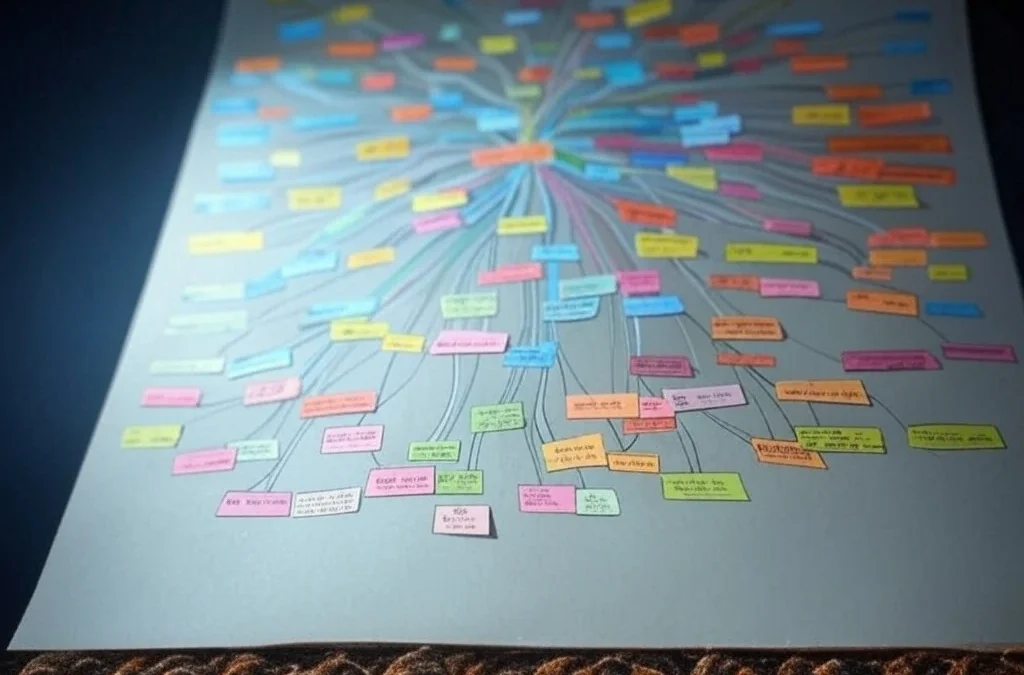Abstract thinking lets us go beyond what’s right in front of us. It helps us tackle complex ideas, solve problems in unique ways, and find patterns we might otherwise miss. This kind of thinking isn’t just for scientists or artists; it’s something we all use daily. Whether we’re planning our future, analyzing a story, or imagining a new idea, abstract thinking pushes us to consider possibilities, picture different scenarios, and dive deeper into understanding.
In this article, we’ll explore 30 practical examples of abstract thinking and show how it impacts everyday life. From interpreting art to strategic planning, abstract thinking helps us connect seemingly unrelated ideas, make sense of complex concepts, and even innovate. Dive in to see how this skill can enrich your life, spark creativity, and help you navigate a world that’s always changing.
What is Abstract Thinking?
Abstract thinking is the ability to go beyond the obvious and consider ideas, concepts, and possibilities that aren’t immediately visible. Unlike concrete thinking, which focuses on specific facts or objects, abstract thinking involves seeing patterns, connections, and meanings that lie beneath the surface. It allows us to interpret symbolism, grasp complex ideas like freedom or justice, and explore hypothetical scenarios.
This type of thinking plays a big role in problem-solving and creativity. It’s what helps us imagine solutions to challenges, understand metaphors, and think strategically about the future. Abstract thinkers can look at a situation from different angles, connecting ideas that may not seem related at first glance. Whether it’s coming up with innovative business strategies or exploring philosophical questions, abstract thinking gives us the mental flexibility to envision new paths and uncover deeper truths.
In daily life, abstract thinking enhances our ability to adapt, learn, and grow. By thinking abstractly, we open ourselves up to new perspectives, which is essential for personal development and professional success.
The Best Examples of Abstract Thinking
Abstract thinking shapes how we see and interpret the world around us. It sparks creativity, fuels problem-solving, and helps us imagine new possibilities. From understanding symbols in art to planning for future goals, abstract thinking lets us go beyond what’s right in front of us. Here, we’ll look at real-world examples in art, science, and business that show how this type of thinking opens up new ideas and connects different concepts. These examples will show you how abstract thinking can enrich both personal insights and professional skills.
1. Metaphorical Language
Imagine trying to explain emotions by comparing them to a storm. A person might say, “Anger is a storm that brews inside you.” This metaphor uses a concrete image (a storm) to describe something abstract (anger). By doing this, it helps others visualize and understand the complex nature of emotions.
2. Algebraic Expressions
Algebra is a perfect example of abstract thinking in mathematics. It involves using symbols and letters to represent numbers and quantities in formulas and equations. For instance, when solving for ‘x’ in an equation, one must think abstractly about what ‘x’ represents and how to manipulate the equation to find its value.
3. Philosophical Concepts
Consider the idea of “justice.” In philosophy, justice isn’t just a law or rule; it’s a concept that varies depending on one’s perspective. When debating what justice means, abstract thinkers consider numerous interpretations and theories, weighing them against each other to form a broader understanding.
4. Strategic Planning
In business, strategic planning requires abstract thinking. Leaders envision a company’s future, often years ahead, and develop plans to achieve long-term goals. They must consider various factors like market trends, competition, and internal resources, creating a roadmap that isn’t immediately tangible.
5. Artistic Interpretation
Artists often use abstract thinking to create works that evoke emotion and thought. For example, abstract painters might use shapes and colors to represent complex themes like chaos or harmony. Viewers engage in abstract thinking to interpret what the artwork means to them personally.
6. Scientific Theories
The theory of relativity is a cornerstone of modern physics that requires abstract thinking to comprehend. It involves concepts like space-time and how gravity affects it. Scientists and students alike must visualize and understand these non-intuitive ideas to grasp the theory’s implications.
7. Problem-Solving in Engineering
Engineers frequently employ abstract thinking when developing solutions to complex problems. They must envision how different components will work together in a system that doesn’t yet exist. This kind of thinking allows them to innovate and design new technologies.
8. Literary Analysis
When analyzing literature, readers use abstract thinking to interpret themes, symbols, and motives. For instance, in a novel, a river might symbolize life’s journey. Readers look beyond the literal text to find deeper meanings and connections within the story.
9. Cognitive Development in Children
Abstract thinking develops as children grow, allowing them to understand concepts like friendship and fairness. A child might think abstractly when they realize that sharing toys isn’t just about the toys themselves but about maintaining good relationships with peers.
10. Innovation in Technology
Innovators in technology often rely on abstract thinking to conceptualize products that have never existed before. For example, when creating a new app, developers must think beyond current technology to imagine how users will interact with it and what problems it will solve. This forward-thinking mindset drives technological advancement.
11. Metaphorical Art Interpretation
Consider a painting that depicts a stormy sea. An abstract thinker might see beyond the literal image, interpreting it as a metaphor for emotional turmoil or life’s unpredictable nature. This ability to draw deeper meaning from visual art demonstrates how abstract thinking allows individuals to connect disparate ideas and emotions to a single, powerful image.
12. Mathematical Concepts
When learning about infinity in mathematics, an abstract thinker appreciates that it’s not just a number but a concept. They grasp its application across different scenarios, such as the endlessness in time or the boundlessness of potential. This mental leap from finite numbers to an infinite concept shows the ability to think abstractly about numerical ideas.
13. Philosophical Reflections
Abstract thinking is central to engaging with philosophical ideas. For example, contemplating the notion of justice, an abstract thinker moves beyond specific laws and cases to ponder the essence of fairness and morality. They explore how justice is perceived across cultures and time periods, illustrating the flexibility of abstract thought in dealing with complex, intangible ideas.
14. Creative Writing
In crafting a story, a writer uses abstract thinking to create complex characters and plots. By envisioning a character’s motivations, fears, and dreams, the writer constructs an internal world that might not directly relate to reality but resonates with universal human experiences. This process showcases the ability to synthesize abstract concepts like love, betrayal, or redemption into tangible narratives.
15. Scientific Theories
Abstract thinking is crucial in forming scientific theories, such as the theory of relativity. Scientists must imagine scenarios that are not directly observable, like time dilation at near-light speeds. This kind of thinking requires seeing beyond the immediate data to hypothesize about phenomena that might only be proven through extensive experimentation and thought experiments.
16. Symbolic Representation in Language
When learning a new language, abstract thinkers quickly grasp that words are symbols for ideas, emotions, or objects. They understand that “freedom” in English might evoke different connotations than its equivalent in another language, revealing the deeper cultural contexts and abstract associations tied to language.
17. Strategic Planning
In business strategy, abstract thinking allows a leader to envision future trends and prepare accordingly. They might foresee how technological advancements could reshape their industry and create flexible plans to adapt. This requires thinking beyond current conditions to anticipate and influence future outcomes.
18. Religious Beliefs
Engaging with religious or spiritual beliefs often involves abstract thinking. Consider the concept of the soul; it’s not something tangible. Believers use abstract thought to explore what the soul represents, its significance in life and afterlife, and how it guides moral and ethical behavior.
19. Metacognition
Abstract thinkers often engage in metacognition, or thinking about thinking. For instance, they might reflect on their thought processes when solving a problem, recognizing patterns and biases. This self-awareness allows them to refine their approach to learning and problem-solving, showcasing an advanced level of abstract thought.
20. Metaphysical Questions
Abstract thinking is at the heart of exploring metaphysical questions, such as the nature of existence. An abstract thinker might ponder the idea of multiple universes, considering the implications for identity and reality. These explorations require stepping beyond the physical world to imagine possibilities and question things like the fundamental nature of being.
21. Imaginative Problem-Solving in Design
Imagine a designer tasked with creating a new type of furniture that fits small spaces without compromising comfort. They don’t just think about materials or structure – they envision the lifestyle of the future user, anticipating needs that aren’t immediately obvious. This abstract approach allows the designer to craft solutions that resonate on a deeper, more intuitive level.
22. Conceptualizing Social Trends
A sociologist analyzing social trends might look at shifts in youth culture not just as isolated events but as reflections of broader, evolving attitudes toward freedom, identity, or technology. By connecting these patterns with historical or cultural contexts, they use abstract thinking to understand why society moves the way it does.
23. Visualizing Possibilities in Urban Planning
Urban planners employ abstract thinking when envisioning city spaces years or even decades into the future. They imagine not just buildings or infrastructure but how people will feel moving through these spaces. This type of thinking enables them to anticipate community needs and design more adaptable, human-centered environments.
24. Understanding Complex Emotions Through Music
Musicians often translate feelings into sounds, using melodies and harmonies to express things words cannot capture. A listener might hear a minor chord progression and interpret it as melancholic or nostalgic. This abstract process—finding meaning in music – allows people to connect with emotions on a visceral level beyond language.
25. Future-Proofing Through Forecasting
In business forecasting, executives must think abstractly to project future market changes. They combine current data with trends, but also ask, “What if?” and consider scenarios that may never happen. This ability to imagine hypothetical futures, even without concrete evidence, drives proactive decision-making.
26. Understanding Identity Through Cultural Narratives
Someone reflecting on identity might consider their place in cultural narratives, thinking about how they fit within social roles or historical contexts. This abstract approach allows them to see beyond surface-level labels and understand themselves in relation to others and the world, forming a complex sense of self.
27. Learning Through Symbolic Play
Children often use toys to act out scenarios that mirror real-life situations. For example, a child might use dolls to “play house,” mimicking adult relationships or emotions. This kind of symbolic play helps them understand abstract concepts like family roles or conflict resolution, even before they have the vocabulary for it.
28. Philosophical Exploration of Ethics
When contemplating ethical dilemmas, an abstract thinker may ponder the “greater good” or moral duty. For instance, they might ask, “Is it better to help one person directly or contribute to a cause that benefits many?” This abstract reflection on ethics lets them explore morality from various angles, shaping a more nuanced view of right and wrong.
29. Interpreting Symbols in Dreams
Dream analysis involves abstract thinking, as dreams rarely present clear narratives. A dream about flying, for example, might represent a desire for freedom or a feeling of being out of control. By abstractly interpreting these symbols, people can gain insight into their subconscious mind and emotional state.
30. Creating Fictional Worlds in Game Design
Video game designers use abstract thinking to build immersive worlds, imagining cultures, landscapes, and histories that don’t exist in reality. Players enter these worlds, engaging with abstract elements like morality systems or imaginary ecosystems. This creative, abstract thinking enables a deeply engaging experience that connects players to the game’s narrative on a personal level.
Read also: 80 Examples of Abstract Things
How Abstract Thinking Differs from Concrete Thinking
Concrete thinking deals with what’s right in front of us – facts, objects, and details we can see, touch, or measure. Abstract thinking, on the other hand, goes beyond the physical. It’s about connecting ideas, seeing patterns, and imagining possibilities. Think of a student learning math. With concrete thinking, they might memorize multiplication tables. With abstract thinking, they’d understand why multiplying works the way it does and how it applies to real-life situations.
In daily life, both types of thinking are useful. Concrete thinking helps us follow a recipe or assemble furniture, where following clear steps is essential. Abstract thinking helps us interpret poetry, understand complex emotions, or solve problems that don’t have a clear answer. Both styles work together, allowing us to handle practical tasks and explore deeper ideas.
Why Abstract Thinking is Essential for Problem-Solving and Innovation
Abstract thinking powers creativity and fuels breakthroughs. When we think abstractly, we’re not just following what’s been done before; we’re imagining what could be. This kind of thinking is behind scientific discoveries, new technologies, and artistic movements. Think of someone designing a new product – they don’t just focus on how it looks; they imagine how people will use it, interact with it, and feel about it. This forward-thinking, abstract approach is what makes new inventions possible.
In business, abstract thinking is key for strategic planning. Leaders don’t just react to today’s market; they look at trends, imagine future possibilities, and think through “what-if” scenarios. This creative problem-solving approach helps businesses adapt and thrive, especially in industries where change happens fast. In short, abstract thinking allows us to solve problems in ways that aren’t immediately obvious and create solutions that go beyond the ordinary.
Developing and Strengthening Abstract Thinking Skills
You can build your abstract thinking skills with a few simple exercises and habits. Start by exploring activities that encourage creativity, like drawing, writing, or even storytelling. These hobbies stretch the mind by pushing you to think beyond straightforward facts. Try to look for deeper meanings in books, movies, or even daily conversations—ask yourself, “What’s the bigger idea here?”
Critical thinking exercises are another great tool. When faced with a decision, try thinking about the “why” and “how” rather than just the “what.” Imagine different outcomes, consider multiple perspectives, and don’t be afraid to question assumptions. Discussing ideas with friends or reading different viewpoints on a topic can also expand your thinking.
Lastly, explore new subjects or learn something completely out of your comfort zone. Taking on a challenging hobby or diving into complex subjects, like philosophy or abstract art, can inspire you to look at the world differently. Building abstract thinking skills isn’t just for work; it can enrich your life, making you more adaptable and open to new ideas.
The Role of Abstract Thinking in Problem-Solving
Abstract thinking plays a crucial role in problem-solving by allowing individuals to step back from specific details and focus on broader concepts. This type of thinking is invaluable when tackling complex problems, as it enables one to identify patterns and relationships that are not immediately obvious. By thinking abstractly, people can devise strategies that apply to a range of situations rather than just one particular instance. For example, instead of memorizing the steps to solve a single math problem, an abstract thinker understands the underlying principles that can be applied to different problems.
In many professional fields, abstract thinking is highly valued because it fosters creativity and innovation. Scientists, for instance, use abstract thinking to develop hypotheses and models that explain natural phenomena. Similarly, in business, leaders who think abstractly can foresee potential challenges and opportunities, leading to strategic decision-making. Abstract thinking also aids in communication, as it allows individuals to express ideas in a more generalized and relatable way. However, this skill is not solely innate; it can be cultivated through education and practice.
Abstract Thinking in Child Development
Abstract thinking is a critical component of cognitive development in children and typically emerges during the later stages of childhood. According to developmental psychologists like Jean Piaget, children begin to develop abstract thinking skills during the formal operational stage, which starts around age 11. During this period, children learn to think about abstract concepts such as justice, freedom, and love. They also become capable of hypothetical reasoning, allowing them to consider possibilities and outcomes that are not rooted in physical reality.
Encouraging abstract thinking in children can be done through various educational activities. Engaging in discussions about moral dilemmas, encouraging creative storytelling, and introducing them to subjects like philosophy can all help develop these skills. It’s important for parents and educators to recognize that children develop these abilities at different rates and to provide support tailored to their individual needs. As abstract thinking advances, children become better at problem-solving and decision-making, which are crucial skills for their future academic and personal success. It’s essential to nurture these skills early on to prepare children for the complex world they will navigate as adults.
The Role of Abstract Thinking in Education
Education systems around the world recognize the importance of abstract thinking. It’s a skill that educators strive to develop in students, as it’s essential for academic success and personal growth. Abstract thinking is what allows students to grasp complex concepts in subjects like mathematics, science, and literature. It helps them understand theories, interpret meanings, and apply knowledge in novel situations.
In the classroom, teachers might encourage abstract thinking through activities that require students to analyze scenarios, create hypotheses, or engage in debates. These activities push students to think beyond the obvious and explore deeper meanings. For instance, in a literature class, discussing themes and symbols in a novel requires abstract thinking. Students are not just recounting the plot; they are interpreting and connecting ideas. This develops cognitive flexibility, a key benefit of abstract thinking.
Moreover, abstract thinking is not just about academic learning. It’s about preparing students for life, helping them navigate the world with a critical and open mind. Students who master this skill are often better at adapting to change and solving unforeseen problems. They are prepared to think on their feet and embrace the complexity of the world around them. In education, fostering abstract thinking is like planting seeds for a lifetime of learning and discovery.
Read also: 30 Best Moral Dilemma Examples
Read also: 20 Momentum Real Life Examples & Definition
The Most Popular on BitGlint

30 Diligence Examples and Definition
Diligence is often the silent force behind extraordinary achievements. While talent and luck certainly play their...

Top 100 Things That Are Important
Everyone has their own perspective on what's most important in life. While priorities might differ from one person to...

50 Moral Principles and Examples of Each
Moral principles serve as the foundation of ethical decision-making, guiding our actions and interactions in everyday...

40 Social Dilemma Examples in the World & Real Life
Social dilemmas are everywhere. They shape the choices we make at work, in our communities, and even on a global...

30 Respect Examples & Definition
Respect is one of the foundation stones of healthy relationships and functioning societies. It involves showing...

30 Wishful Thinking Examples & Meaning
Wishful thinking is something we all do at some point. You hope things will turn out fine—even if there’s no real...

Zesty: 30 Examples & Definition and Meaning
Zestiness brings energy, excitement, and bold flavor to life. Whether in food, personality traits, or activities,...
Get Inspired with BitGlint
The Latest
50 Great Wisdom Examples & Helpful Advice
Wisdom is one of the most important qualities a person can have—but also one of the most misunderstood. It’s not just about being smart or well-read. It’s about making good choices, learning from experience, and seeing beyond the surface. In a world full of fast...

30 Divergent Thinking Examples & Definition
Divergent thinking is a powerful mental process that allows us to generate multiple solutions to a single problem. Unlike convergent thinking, which narrows down options to find one correct answer, divergent thinking expands possibilities by exploring numerous...
20 Examples of Secondary Consumers in the Food Chain
Secondary consumers are animals that eat other animals—usually herbivores that feed on plants. They’re an important part of how food chains work. You won’t find them eating grass or leaves. Instead, they hunt or scavenge animals that already got their energy from...
30 Moral Reasoning Examples & Definition
Moral reasoning is something most people use every day, often without even realizing it. It’s the thought process behind the choices we make when we’re trying to figure out what’s right and what’s wrong. These choices happen in simple moments—at home, at work, with...

